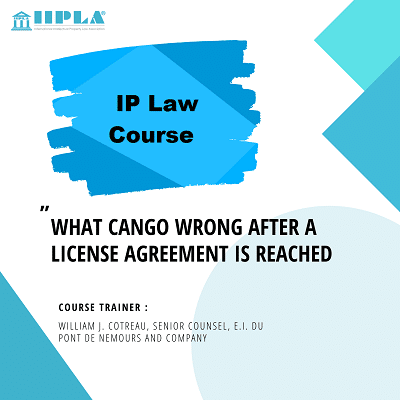Details
About the Course:
So you think you’re done? You have an invention. You were issued a patent on that invention. You executed a licensing agreement with a powerful licensee. The licensee seems really jazzed about promoting products with your invention. So now, you might believe, you can just sit back and collect your royalties.
Well it doesn’t always work like that.
Many inventions do not reach the marketplace despite their being licensed to dominate players. This course provides valuable insight into the factors that can stand in the way of promising technologies reaching the market despite high levels of interest on the part of powerful licensees.
This session is important for inventors that expect to receive royalty revenues as well as for analysts modeling in the probabilities of the receipt of such revenue. The following are among the issues discussed during this highly informative webinar:
- What can go wrong with a patent during licensing negotiations that could derail an agreement?
- What are the benefits of executing Term Sheets or Memoranda of Understanding during licensing negotiations?
- Should licensors have a Freedom of Operations Opinion Letter prepared before meeting with potential licensees?
- How valuable are licensor indemnifications to licensees?
- How should licensors be compensated during the time in which the licensee is attempting to win regulatory approval for the use of the subject technology?
- Why should licensors seek to receive access to regulatory data collected by licensees during the time in which the technology is being tested?
- Should third parties be included on licensor-licensee steering committees?
- What are the pros and cons of licensing into a company that is managed centrally?
- How might licensing into a franchise system cause a licensee’s execution plan to falter?
- How might unions impede the roll-out of a technology despite the licensee’s best efforts?
Course Leaders: William J. Cotreau, Senior Counsel, E.I. du Pont de Nemours and Company
Bill has been a senior patent lawyer with E.I. du Pont de Nemours and Company since 1999. Currently, at DuPont, Bill is a senior counsel to the Intellectual Assets Business (IAB), DuPont’s centralized licensing business. He drafts and negotiates intellectual property agreements for a broad array of DuPont’s Strategic Business Units. He also assists other attorneys in structuring, negotiating and drafting intellectual property transactions and informs the legal function of financial and tax issues which affect license structure. He prepares and prosecutes patent applications in electrochemical and polymer art areas. Prior to his employment at DuPont, Bill served as senior Intellectual Property Counsel at Mobil Business Resources Corporation (a division of Mobil Oil).
Martin Lindsay, Director of Strategic Business Development, Bowers & Wilkins
Martin Lindsay’s role at Bowers & Wilkins started with establishing the company’s automotive licensing business based on an exclusive licensing agreement with Jaguar Cars in the UK. With his licensing background, Martin has contributed to licensing contract negotiations, licensing certification and quality assurance activities, and to patent and IP strategies for new markets and new applications.
Prior to joining Bowers & Wilkins, Martin worked for 20 years at Dolby Laboratories in San Francisco, helping grow its licensing portfolio from at-will noise reduction offerings to surround sound, mobile, automotive audio entertainment technologies, including new audio technology standards for broadcast and consumer electronics like Dolby Digital.
During his career with Dolby, Martin was responsible for technology strategy and establishing new markets (in particular China) and pursuing new market opportunities such as mobile entertainment. Martin also managed the company’s product and IC licensing certification programs, devising a number of new practices and processes geared to improving efficiency and quality assurance.
Course Length: Approx. 1.0 hours
$175 PER USER









There are no reviews yet.